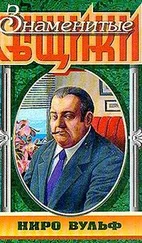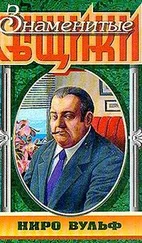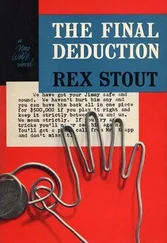Wolfe looked at Saul.
“Nothing even warm,” Saul said. “It always helps to see a subject, but Archie had already seen him, so it’s no news that he’s a middle-aged slouch who may have been quite a fine figure twenty-three years ago. He has two little rooms, with him in one and a blonde with too much lipstick in the other, and when I asked about his past and present clients he either had very little to show or he wasn’t showing me. Of course he wanted to know who Parker’s client was, that was natural, but he pressed me on it more than he should have. I was getting so little that I almost made a mistake. I thought of asking him if he had ever had a television producer for a client, but of course I didn’t. I was thinking on my way there that it might be possible to get something with a nice collection of his fingerprints on it, but he was right there with me in that little room. If he locks the door when he leaves that would be no problem. The lock’s an ordinary Wingate. Archie or I could open it with our eyes shut.”
Wolfe shook his head. “We have no use for fingerprints now. Possibly later.”
“I know, but I thought it would be nice to have them. I mentioned it only because I can’t match what Archie got — that nineteen forty-four address.” Saul looked at me. “It’s still August and the weekend starts in a couple of hours.” He got up. “Let’s go, you can plan it on the way.”
For two able-bodied, quick-witted, well-trained men Saul and I accomplished a lot in the next two days. He got a haircut, which is quite a feat on a Saturday or Sunday in summer for a man who lives in midtown Manhattan. I detected it when I met him Monday morning. As for me, I frittered away $23.85 of the client’s money on taxi fares and tips between ten a.m. and seven p.m. Saturday, which is also quite a feat. Just three doors away from Ten East Thirty-ninth Street was a lunchroom, Dwyer’s, with a long fountain counter, and the manager told me it had been there for thirty years. He had himself been there nineteen years, and that meant only since 1948, but he knew the name of the man who had preceded him and he had an address in the Bronx where he had lived. The name was Herman Gottschalk, and I spent nine hours trying to track him down so I could show him photographs of seven young women.
That wasn’t dumb; it was merely desperate. Of course the obvious place to look for someone to ask about the tenants and frequenters of that building in 1944 was the building itself, but Saul and I had pretty well covered that Friday afternoon. There was no elevator man or other service man who had been there more than four years except the building superintendent. He had got the job in 1961, soon after the building had been acquired by its present owner, and he told Saul his predecessor had been there only five years. He didn’t even know the name of the former owner or agent. He did know that none of the present tenants had been there as long as twenty-three years. At the Third Avenue office of the East and West Realty Corporation, the current agent, the only personnel on duty Saturday morning were a girl whose mother should have made her wear teeth braces and an old man with a glass eye who didn’t even know the name of the previous owner or agent.
I accomplished something else on Sunday. I took Lily Rowan and Amy Denovo to a double-header at Shea Stadium, and got the client back to the penthouse safe and sound.
Monday morning a sunburned woman at the East and West Realty Corporation gave us the name of the previous agent, Kauffman Management Company, and at their office on Forty-second Street we were lucky enough to find a smart and active young man who believed in giving service. He spent half an hour looking up old records. The man who had been the superintendent at Ten East Thirty-ninth Street in 1944, named William Polk, had died in 1962. There was no record of the names of any of the service personnel, but there was a complete list of the 1944 tenants — twenty-two of them, counting Floyd Vance — and we copied it. The smart young man said there was no one active in the Kauffman Management Company who had been there for twenty-three years. Bernard Kauffman, who had founded it, was dead.
Saul and I each took half of the list of tenants and went to work on them. I could make a full report on the first four I tackled, but this is not a treatise on economics or sociology. It was the fifth one that rang the gong, a little before five o’clock in the afternoon — a woman named Dorothy Sebor, fifty, gray-haired and blue-eyed and fully as smart as the young man at the Kauffman Management Company — who headed and probably owned the Sebor Shopping Service in a tenth-floor suite at Rockefeller Center. She was busy. The forty-five minutes I spent with her wouldn’t have been more than half that if the phone hadn’t interrupted several times, and I might have had a problem getting to her if I hadn’t sent in word that I wanted to ask her something about Ten East Thirty-ninth Street. When I entered her room she asked if I was the Archie Goodwin who worked for Nero Wolfe, and when I said yes she asked, “But what can I possibly tell you about Ten East thirty-ninth Street? I left eighteen years ago. I loved that dump. Sit down.”
I sat. “I don’t know what you can tell me, Miss Sebor, but I know what I want to ask. A job we’re on goes back pretty far and it’s nineteen forty-four we’re interested in. Would you mind telling me what floor you were on?”
“No, why should I? The ninth. In the rear.”
“We understand that another of the tenants was named Floyd Vance. Did you know him?”
“I wouldn’t say I knew him, I knew him by sight, he was on the same floor, the ninth, down the hall toward the front. We exchanged nods, remarks about the weather; you know how it is.”
My hand didn’t want to go to my pocket. It had pulled those damn pictures out too many times for too many people. But it obeyed orders and out came the seven photographs. “The quickest way,” I said, “is for you to take a look at these and tell me if you recognize anyone.” As I stretched an arm to hand them to her the phone rang, and she put the pictures on the desk. When she finished telling someone what to do and hung up she picked them up and started looking. At the fourth one — I always had it in the middle — she widened her eyes, looked at me, looked at the photograph again, and said, “It’s... not Vance... Vaughn, that’s it. Carlotta. Carlotta Vaughn.” The blue eyes aimed at me, a little narrowed. “I saw her name not long ago, in an ad in two papers. The ad said something about alias somebody.”
“You knew her?”
“Yes. She worked for that Floyd Vance. Or with him, I didn’t know which.”
I had two strong conflicting impulses simultaneously: to give her a good hug and kiss her on both cheeks, and to pull her nose for not answering the ad a week ago. I put one of them into words. “Miss Sebor,” I said, “you are the most beautiful woman I ever laid eyes on and if I knew what color you like I would buy you ten dozen roses. With our client’s money, of course.”
She smiled, more with her eyes than her mouth. “My shopping service hasn’t worked much on florists, but it would be interesting to try. Apparently I’ve dealt you an ace.”
“Four of them. You’ve answered a question that I was beginning to think would never be answered. If you will—”
“Is Carlotta Vaughn your client? No, of course not, not if you placed that ad. You’re trying to find her?”
“No. She’s dead. I’d like to tell you about it, but you’re busy and it’s a long story, and as our client says, it’s very personal. If you’ll answer a few more questions I’ll be extremely grateful. Was it in—”
The phone. That time it took longer; she was telling someone what not to do. She finally finished it and returned to me. “I’ll ask you a question, Mr. Goodwin. I liked Carlotta Vaughn, and she impressed me as a very competent young woman. I didn’t see a lot of her — we had lunch together a few times — but I saw enough of her to be impressed. I was trying to get my business started and it was hard going, and I tried to persuade her to go in with me, as a partner, but she wouldn’t. I liked her very much. You say she’s dead. Would she approve of what you’re doing?”
Читать дальше












